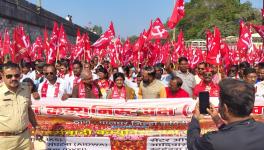MP: Rahul Gandhi’s Bharat Jodo Yatra Touches a Chord With Marginalised Sections
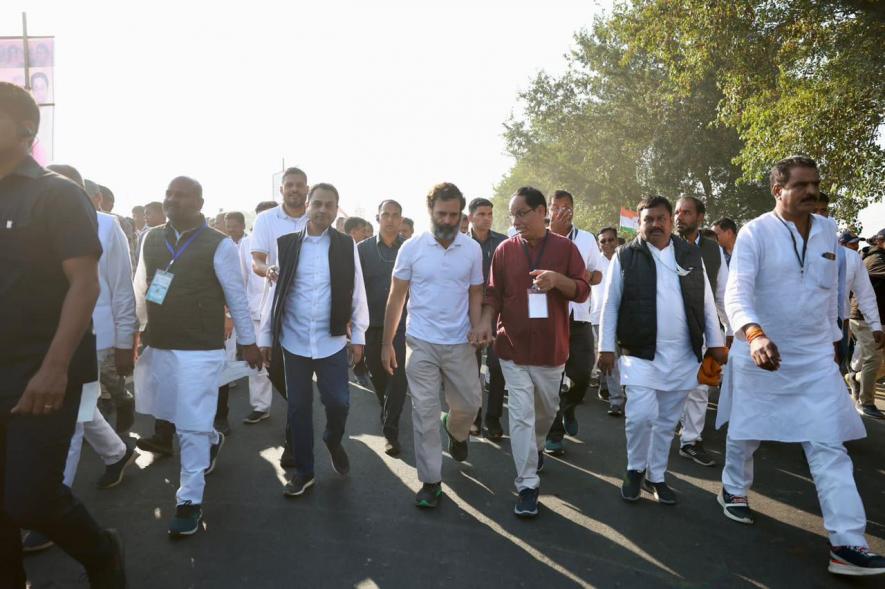
Bhopal: Nirmala Bai, 48, a dalit from Khargone's Maniyar village, uprooted her cotton crop sowed in a one acre field to make space to set up camps for Rahul Gandhi's Bharat Jodo Yatra.
For Nirmala, who is feeling the pinch of inflation, the Yatra is a ray of hope that may unite the country paving the way for Congress to return to power and put an end to the skyrocketing inflation and price rise. She believes that Congress' policies are more inclined toward marginalised sections rather than the current dispensation.
Nirmala, who would have earned over Rs 50,000 from that crop, said: "Desh aur samvidhan bachega to khub aise fasal uga lenge." (If the country and the Constitution is saved, I can grow more of this crop again)
"राहुल गांधी देश के लिए चल रहे है इसलिए 50,000 की फ़सल काट दी,"
खरगौन के मनिहार गांव निवासी हिमाला बाई ने अपने 1 एकड़ ज़मीन पर कॉटन की फ़सल लगाई।
पर उन्होंने जब सुना की यात्रा गांव से गुज़रे रही है और उन्हें ज़मीन चाहिए तो अपनी तैयार फ़सल काट दी।
"देश बचेगा तो फ़सल उगा लेंगे।" pic.twitter.com/iSenqlARbY
— काश/if Kakvi (@KashifKakvi) November 26, 2022
The Bharta Jodo Yatra got a grand welcome as it entered Madhya Pradesh's Burhanpur on November 23 -- a Muslim-dominated city. The following day, former Congress president Rahul Gandhi visited the village of tribal freedom fighter Tantya Bhil in Khandwa eyeing the 21% tribals in the state. The next day, he performed Narmada aarti and visited Omkareshwar temple before reaching Mhow, the birthplace of Baba Saheb Ambedkar.
However, the Yatra got a lukewarm response in Khandwa and Khargone as it passed only the outskirts of these districts to reach Mhow on the evening of November 26, that also marked the Constitution Day for India.
At the memorial of BR Ambedkar, Rahul Gandhi was joined by newly appointed Congress president Mallikarjun Kharge -- one of the tallest dalit leaders of the Congress party, who administered an oath to protect the Constitution to the crowd.
"From Kerala to Madhya Pradesh, the Yatra's route was modified only once, to reach Mhow on Constitution Day," said Rahul Gandhi in Mhow.
In four days of the Yatra, Gandhi did seem to touch a chord with Muslims, tribals and dalits, who account for 43-44 % of the state's population. He spoke about inflation, unemployment caused by GST (goods and services tax) and demonetisation, hike in petroleum and LPG price. Simultaneously, in light of ongoing issues, he made a scathing attack on the Rashtriya Swayamsevak Sangh-- the parent organisation of the ruling Bharatiya Janata Party.
Apart from reviving the party cadre, the former Congress president has been attacking BJP's ideology and its ideologue, the RSS.
Addressing tribals in Khandwa, Rahul Gandhi attacked RSS and BJP for calling adivasi (original inhabitants) as 'vanvasi' (forest dwellers) and demanded an apology. He referred to the “relations” between RSS and the British Raj while referring to the martyrdom of Tantya Bhil, who was hanged by the British.
In Mhow, the Congress leader spoke about the Constitution and its importance. He targeted the RSS for not hoisting the national flag for decades after the Independence. Attacking BJP and RSS, he said: "They worship BR Ambedkar but oppose his Constitution. They worship Gandhi who gave a message of non-violence and to be fearless but spread hatred and violence. RSS peeth mein chura ghopne ka kaam karti hai, samne se waar nahi karti," (RSS has always been a back-stabber) he said Mhow.
"This is not a political but an ideological Yatra," said Chauleshwar Chandrakar, one of the nine permanent yatris from Chhattisgarh, old NewsClick. He said he has been walking with Gandhi from the inception of the yatra in Kanyakumari told Newslick.
A day after Gandhi made a scathing attack on BJP over ‘adivasi’ and ‘vanvasi’ in Khandwa, a video of the Yatra tweeted by the BJP IT Cell in-charge sparked a controversy. Sharing a video, he alleged that slogans of 'Pakistan Zindabad' were raised in the Yatra and attacked Congress for being “anti-national.”
In response, Congress rebuffed the allegations and warned of legal action. Chief Minister Shivraj Singh Chouhan too threatened action in a tweet.
The following day, Congress lodged an FIR in Raipur's Civil Line police station against BJP's state media in-charge Lokendra Prashar under five sections of the IPC for tweeting a doctored video. A day later, the Bhopal Crime Branch lodged an FIR under the same sections of the IPC against two Congress functionaries, Piyush Babele and Abhay Tiwari.
After walking almost 24-km a day and meeting members of various social groups, individuals, associations and community leaders, Gandhi emphasising that he was walking to listen to the 'mann ki baat' of citizens instead of his own.
At the end of each day of the Yatra, Gandhi addresses a gathering for 15-20 minutes where he explains the reason for carrying out Yatra and its significance. He also criticises the policies of the Union government which have “cast a shadow on common citizens.”
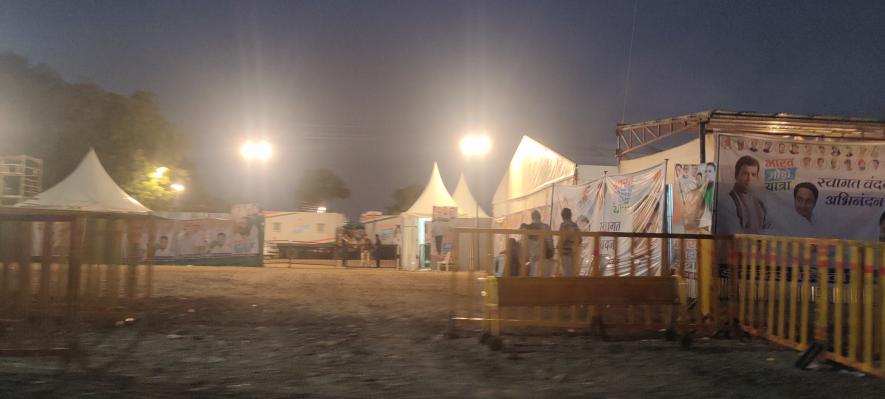
To convey his points effectively, he often switches off his mic during the speech to draw attention to the biased approach of the media and the BJP government which had “stifled the voices” of the Opposition. After switching off the mic for nearly 15 to 20 seconds when the public begins to complain, mistaking it as a technical snag, he switches on the mic, saying: "This is what happens when the Opposition tries to raise your voice in Parliament. They switch off our mics like I just demonstrated.”
Gandhi’s speech also dwells on how media is being :throttled” from highlighting the plight of people, how they (the ruling regime) control autonomous institutions including the highest court in the country, and how dissent is being quelled by “misusing” central agencies against the Opposition and dissenters.
“Those critical of the ruling government and its policies are framed in FIRs. Left without option, we started the Yatra to unite people, convey our messages and draw public support," he said.
As Yatra entered Khandwa district on November 24, a man aged over 60, walking alongside the Yatra with a bunch of farmers, was heard saying that he gave his youth to the Congress. But after the assassination of Rajiv Gandhi and the subsequent fight for the succession, drove him away from the party. With time, he inclined towards the BJP in the elections.
The farmer, who was walking with his sons, grandsons and a bunch of villagers, in a white turban, was heard explaining to other yatris how Rahul Gandhi's Yatra had “awakened his inner consciousness to return to his roots.”
Burhanpur, Khandwa, Khargone, Indore and Ujjain -- where the Yatra has passed -- all fall under the Malwa-Nimar region of Madhya Pradesh, an RSS stronghold. The Malwa-Nimar region accounts for 66 of the 230 seats in the Assembly and is also communally sensitive with a history of communal riots.
Out of nine Assembly seats of Burhanpur, Khandwa and Khargone that the Yatra crossed, five have been won by the ruling BJP, three by Congress and one by an independent candidate.
Speaking on the importance of the Yatra in a polarised district like Khandwa, Deepak Arjare (48), manager of a well-known city restaurant, observed: "Despite all odds, Congress is getting traction on the Yatra. It is crossing the outskirts of Khandwa, yet, people are curious to listen issues being raised by Rahul Gandhi. As far as polarisation is concerned, they (Congress) are not leaving any stone unturned to woo Hindu voters as well."
He further said, "The Yatra is an overhaul of Congress and Rahul Gandhi. With this yatra, Gandhi will understand the internal politics of the party, weaknesses of the party and issues of the states he is passing through. This will help him strengthen the party's top leadership."
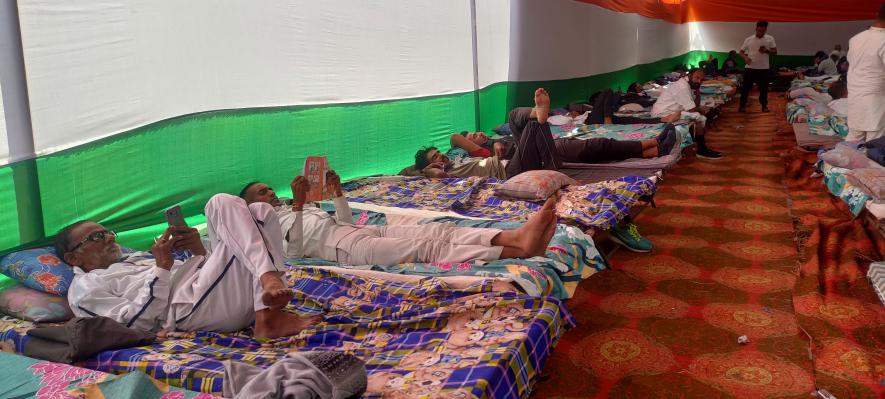
When asked about the ‘Brand Rahul Gandhi’ against ‘Brand Narendra Modi’, he said: "I have been following this yatra for a long time. Gandhi is overcoming the image of a non-serious politician. He takes strong decisions like Modi and pulls crowds as well. Like Modi, he has learnt to attack the Opposition parties with their own weapons, like he attacked BJP for calling ‘adivasis’ as ‘vanvasis’. He looks more sensitive and kinder than Modi."
When Yatra was camping at Khargone's Mortakka village on November 25, a debate broke out at midnight at a restaurant, nearly 100 meters away from the camp, between the staff of the tea stall and police officers. It began when a customer sought their opinion over the impact of Yatra, they began talking about price rise, LPG, inflation, costly electricity and others.
Hearing this, the utensil cleaner of the restaurant, Ravi (40) started speaking about notebandi, lockdown and price rise. The officials were concerned over the future of their children as education was getting costlier and the job market was shrinking. "The Yatra has created a momentum. If Congress manages to maintain it, we can witness a big change in Madhya Pradesh," said a 50-year-old transport officer from Khandwa, who was on duty there.
In one of the events, a Congress veteran, who was addressing a small group of workers, was heard explaining the BJP government’s privatisation and inflation drive linking it with one of the strategies of Chambal's dacoits.
A Congress veteran from Bhind -- infamous for dacoits in the 1990s, said: "In Chambal, when dacoits plan to loot the wealth of the villagers without spilling blood, they first organised a dance party (known as Bai ka Naach) on the outskirts of the village. When all the men and women gathered at the event, they sneaked out and ran away with all the wealth. PM Modi is doing the same to the country by pitching one community against another using media and social media and slowly selling off the nation's wealth to his industrialist friends and party leaders."
After Omkareshwar, on November 29, Gandhi offered puja at Ujjain Mahakaleshwar Jyotirlinga -- the second Jyotirlinga of the state.
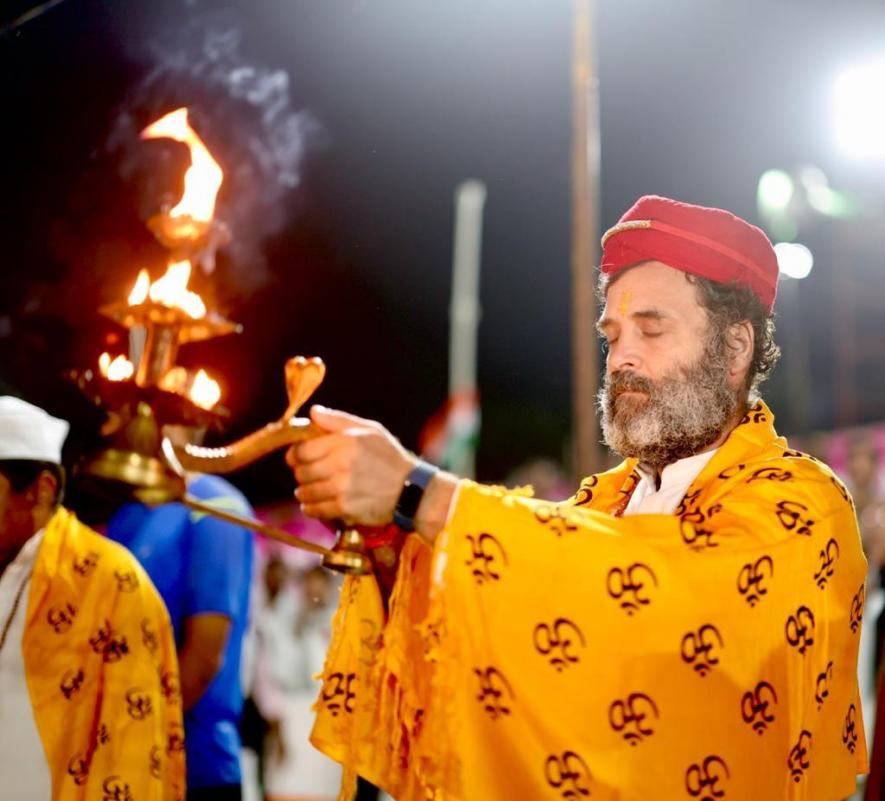
Before visiting Mahakal Temple, he visited Jain Muni Swami Praygya Sagarji Maharaj and spent almost 30 minutes there.
Addressing a rally after his temple visit, Gandhi said: "All gods of Hindu dharma have done tapasya (penance). There is no match of tapasya of Lord Shiva, Krishna and Ram. But the country has more tapasvis and they are labourers, farmers, shopkeepers, students, etc., but they are getting nothing from the government. Those who are worshiping Modi are getting all."
Ujjain and Indore districts, where the Yatra has witnessed an overwhelming response, have 16 Assembly seats. The BJP has the bulk of nine seats while Congress has won seven seats in the 2018 Assembly elections.
Speaking over the impact of Yatra, an Indore-based businessman Dhananjay Aggawal said: "It's true that Yatra is getting public attention and people are listening to the new avatar of Rahul Gandhi. Whether the crowd in the yatra translates into votes or not, only time will tell. But the Yatra will strengthen the party and its cadres and the Opposition in the country."
Overwhelmed by the response in Indore and Ujjain, Gandhi said: "When I started from Kerala, I presumed that we will not see such response in other states. But Maharashtra took the lead on Kerala. Now I can say, what I saw in Indore and other parts of Madhya Pradesh is more overwhelming."
The last leg of the Yatra will pass through Agar Malwa district before entering Rajasthan's Jhalawad on December 4.
Get the latest reports & analysis with people's perspective on Protests, movements & deep analytical videos, discussions of the current affairs in your Telegram app. Subscribe to NewsClick's Telegram channel & get Real-Time updates on stories, as they get published on our website.















